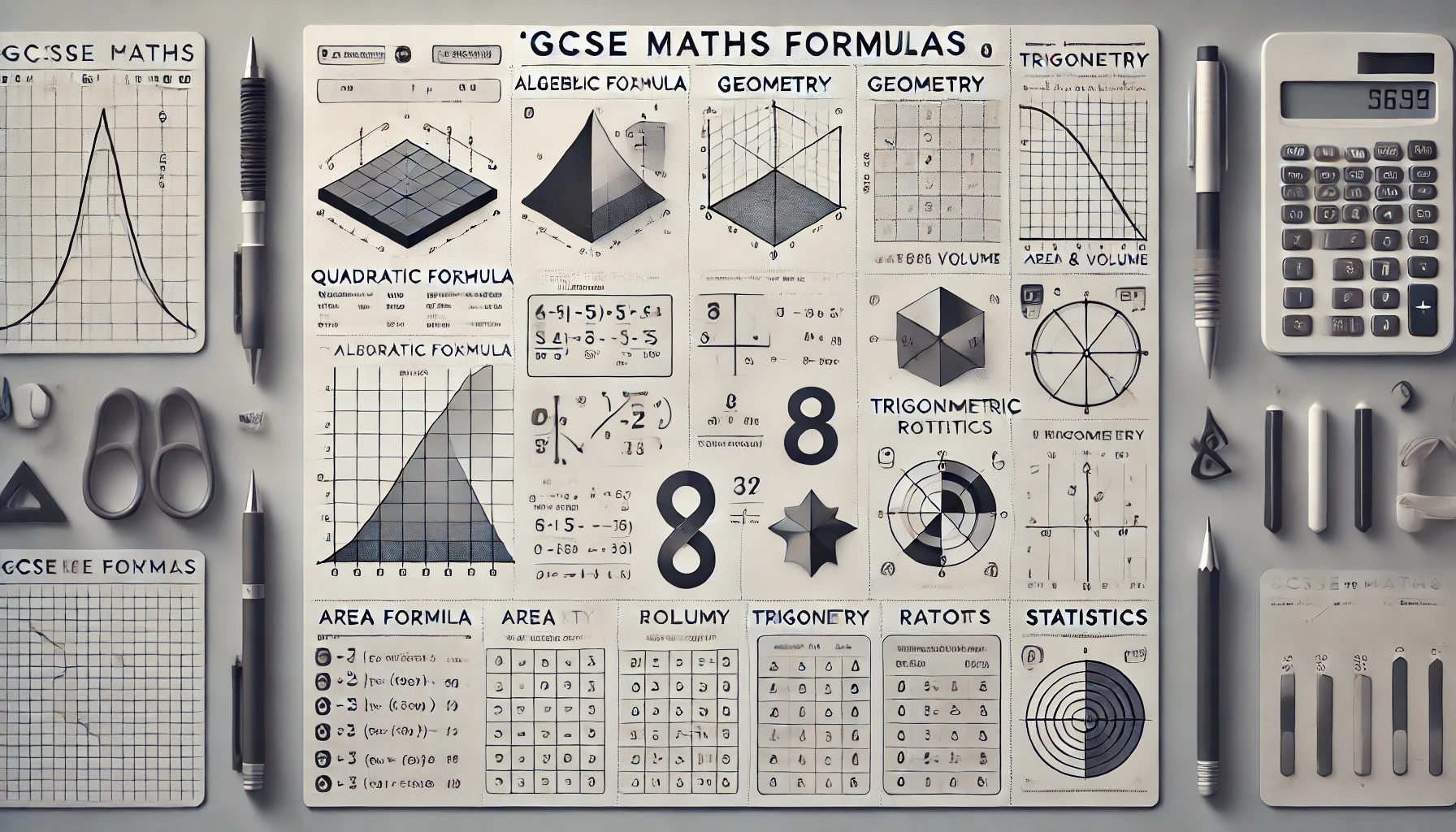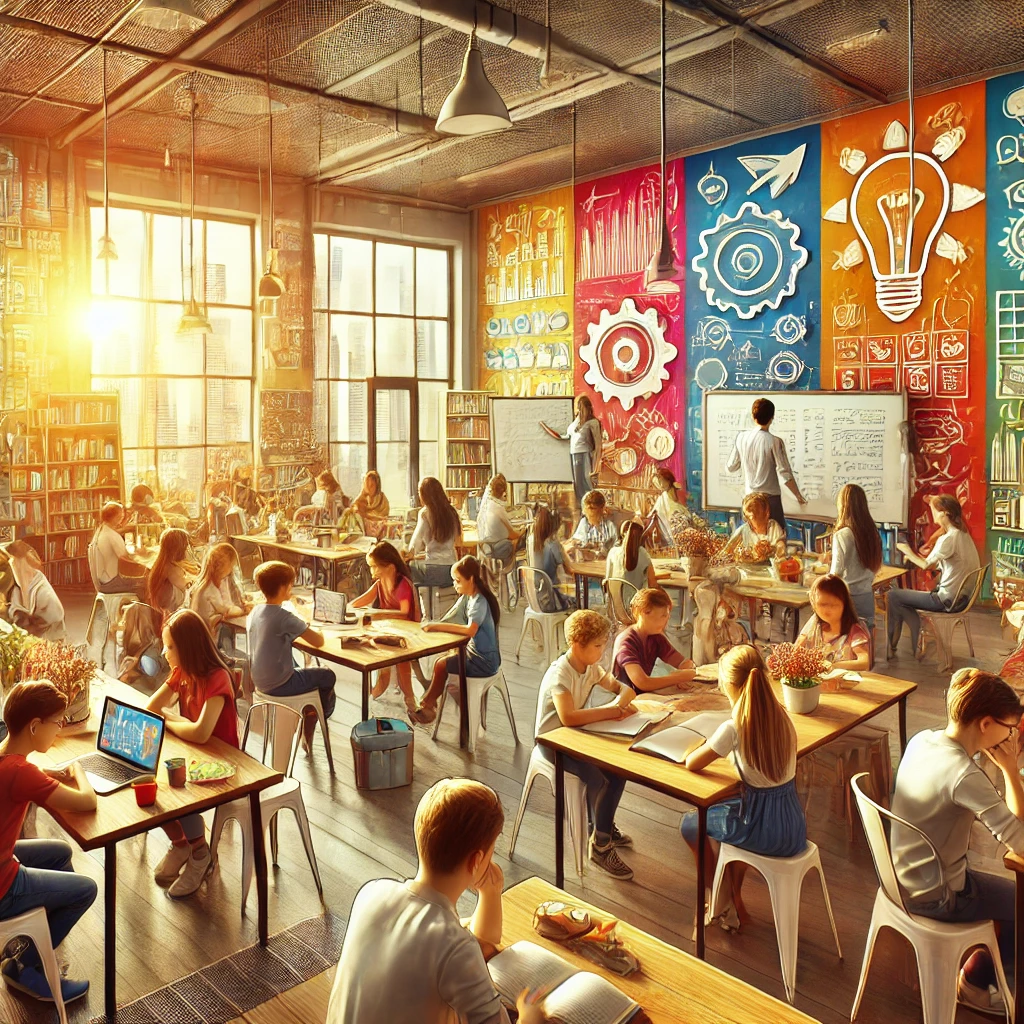GCSE Drama is a dynamic and creative subject that offers students the chance to explore the world of theatre, acting, and performance. As part of the GCSE curriculum, it combines practical skills with theoretical knowledge, allowing students to develop as performers, directors, and critical thinkers.
The demand for GCSE Drama has steadily increased, especially among students passionate about creativity and storytelling. It’s not just for those aiming for a career in the performing arts; the subject also builds transferable skills like teamwork, communication, and problem-solving, which are valuable in any field.
In this guide, we aim to help students navigate GCSE Drama with ease. We’ll cover its key content, what you’ll learn, and how to prepare effectively. Whether you’re curious about acting techniques, the role of a director, or the theory behind great performances, this guide will be your comprehensive resource for success.
What Is GCSE Drama?
GCSE Drama is a subject that allows students to explore the art of theatre through a combination of practical and written work. It provides an opportunity to develop creative ideas, refine acting and directing skills, and critically analyse dramatic performances.
GCSE Drama course typically includes:
As a student you might be interested what do you do in drama GCSE? well, we provide detailed information what this course includes and what is awaiting for you, if you decide to get into drama class:
- Performing: Students act in plays, either devised by themselves or pre-written.
- Directing: Exploring how to bring scripts to life through creative staging and performance techniques.
- Analysing: Evaluating live theatre performances and understanding how technical and performance elements work together.
- Theoretical Study: Learning about drama history, famous playwrights, and key drama techniques.
Let’s dive in and explore more about GCSE drama course.
What Do I Learn in GCSE Drama?
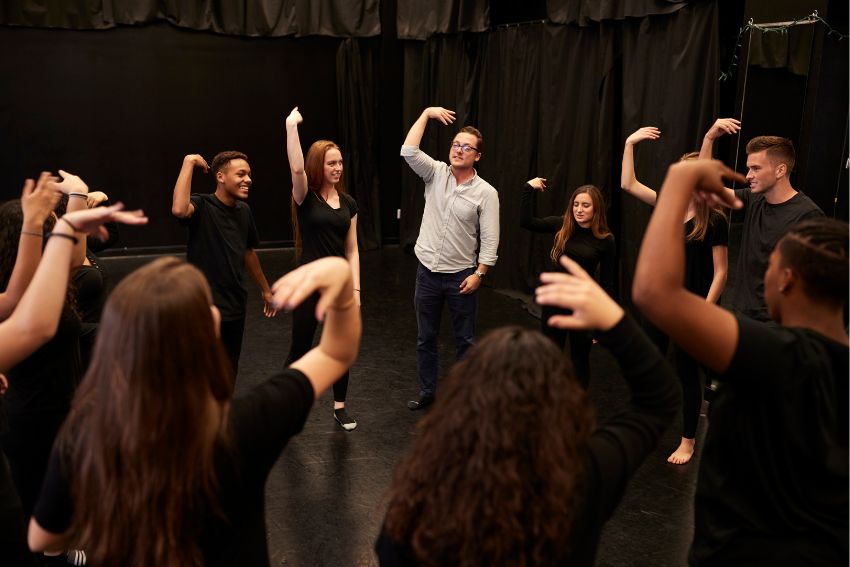
GCSE Drama is an inspiring and hands-on subject that goes far beyond just acting. It combines creativity with teamwork, analysis, and technical skills, helping students develop both as performers and as thoughtful critics of theatre. Here’s a more detailed look at what students learn in GCSE Drama:
Acting and Performance Skills
Students learn how to express emotions, create believable characters, and tell compelling stories through performance. This includes:
- Improvisation: Thinking on your feet to create spontaneous dialogue and action.
- Voice Training: Using pitch, tone, and projection to deliver lines effectively.
- Body Movement: Understanding how gestures, posture, and facial expressions can communicate emotions and meaning.
- Characterisation: Learning to step into a character’s shoes and portray their personality and motivations convincingly.
Teamwork and Collaboration
Drama is rarely a solo effort, and GCSE Drama emphasizes working as part of a team. You will learn how to Collaborate with peers to create and rehearse performances. You will be able to solve creative challenges together, such as staging a play with limited resources. Also, you’ll learn the importance of listening, sharing ideas, and supporting each other during rehearsals and performances.
Creative Expression and Devising
Students explore their creative side by developing original ideas and bringing them to life on stage. This includes:
Devising Performances: Creating original scenes or plays from scratch based on themes, prompts, or personal experiences.
Experimenting with Styles: Trying different theatrical techniques, such as naturalism, physical theatre, or abstract drama.
Exploring Themes: Using drama to tackle important issues like social justice, relationships, or identity.
Understanding Theatre Production
Theatre isn’t just about acting—it’s also about the technical and creative elements that bring a performance to life. Students learn:
Lighting and Sound: How these elements create mood, atmosphere, and dramatic impact.
Set and Costume Design: The visual aspects of a play that help tell the story and define the setting.
Roles in Theatre: Understanding the responsibilities of directors, stage managers, and other key figures in a production.
Analysing Drama
Watching, analysing, and evaluating live or recorded performances is a core part of GCSE Drama. Students learn to:
Critique Performances: Identify what works well and what could be improved in acting, staging, and technical design.
Understand Audience Impact: Analyse how a performance connects with its audience and conveys its message.
Draw Inspiration: Use ideas from professional productions to enhance their own work.
Theoretical Knowledge
Drama has a rich history and cultural significance, which students explore through:
Playwrights and Plays: Studying works by famous playwrights like Shakespeare, Brecht, or Miller.
Styles and Genres: Exploring different approaches to drama, from realism to physical theatre.
Contextual Studies: Understanding how historical, social, and cultural factors influence the creation and interpretation of plays.
Why Is This Important? GCSE Drama doesn’t just teach students how to act—it develops communication, confidence, creativity, and collaboration skills that are useful in any career. Whether you aim for a future in performing arts or simply want to build life skills, GCSE Drama provides a foundation that lasts a lifetime.
What Is an Aim of GCSE Drama Course?

GCSE Drama is a course designed to inspire creativity, confidence, and collaboration in students while equipping them with practical and analytical skills. It provides a unique blend of hands-on experience and theoretical understanding, making it a versatile subject suitable for a wide range of interests and aspirations.
What Should GCSE Drama Specifications Enable Students To Do?
GCSE specifications in Drama aim to provide students with a well-rounded education that combines practical theatre experience with theoretical knowledge. The key objectives include:
Create and Perform – Enable students to devise original performances, drawing on their creativity and imagination. Provide opportunities to perform scripted plays, exploring various theatrical styles and genres.
Understand and Apply Drama Techniques – Teach students the techniques of acting, directing, and stagecraft. Enable them to apply these skills to real-life scenarios, including performances and group projects.
Analyse and Evaluate Performances – Develop the ability to critically analyse live theatre, identifying the impact of acting, staging, and technical elements. Encourage students to evaluate their own work and that of others, providing constructive feedback.
Appreciate Theatre History and Context – Introduce students to significant plays, playwrights, and movements in drama. Help them understand how historical, social, and cultural contexts influence the creation and interpretation of theatre.
Build Transferable Skills – Foster teamwork, communication, and problem-solving abilities. Develop confidence in public speaking and presenting ideas, skills valued in all careers.
What Kind of Course Is GCSE Drama?
The course structure is tailored to allow students to discover their strengths, whether in performing, directing, or analysing, and to develop confidence in their abilities.
GCSE Drama is a unique subject that empowers students to express themselves creatively while building essential life skills. Whether aspiring actors, directors, or simply drama enthusiasts, students are given the tools to explore, perform, and understand the art of theatre in depth.
What Is A Subject Content For GCSE Drama?
GCSE Drama offers a dynamic mix of practical performance and theoretical study, helping students explore the world of theatre while developing critical skills. The subject content ensures students gain comprehensive knowledge of performance texts, dramatic works, and the processes involved in staging productions.
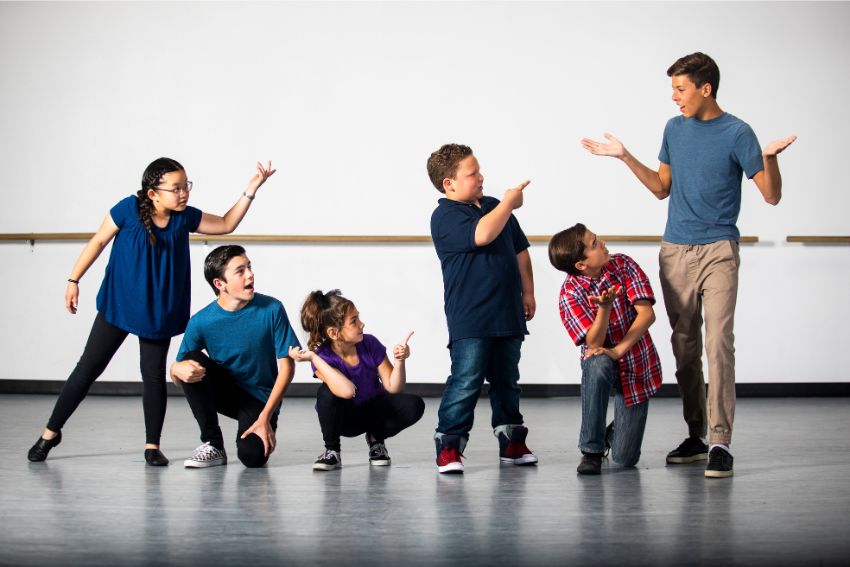
Performance Texts and Participation
In GCSE Drama, students engage deeply with a variety of performance texts and are often required to participate in both scripted and devised performances. The subject is highly practical, and active participation is a key component. Here’s what this involves:
Studying Performance Texts: Students explore plays written by established playwrights, which may include both classical and contemporary works. These texts serve as a foundation for understanding different styles, genres, and historical contexts.
Performances: Students are typically required to perform extracts from these texts, allowing them to bring characters and stories to life. This can include:
Acting: Taking on roles and performing in front of an audience.
Devising Original Work: Creating their own pieces based on themes or stimuli provided by the teacher or exam board.
Technical Roles: Some students may focus on set design, lighting, sound, or costume, contributing to the overall production.
Active participation helps students apply theoretical knowledge practically, enhancing their understanding of drama as both an art form and a means of communication.
Knowledge and Understanding
GCSE Drama specifications aim to develop students’ knowledge and understanding of various aspects of performance texts and dramatic works. This includes a comprehensive study of the following characteristics:
Genre – You learn different genres such as tragedy, comedy, melodrama, and absurdism and will understand how genre influences the themes, characters, and audience expectations.
Structure – You’ll Analyze how plays are constructed, including acts, scenes, and the use of dramatic tension. Also, you’ll Explore narrative techniques like flashbacks, non-linear storytelling, and climactic build-ups.
Character – As a drama student, you’ll Study character development and motivation. Learning how to portray complex characters through voice, movement, and interaction.
Form and Style – Also, you Examine various forms of theatre, such as physical theatre, naturalism, and expressionism. Additionally, you’ll stylistic choices and how they affect the delivery and reception of a performance.
Language – You’ll Analyze the playwright’s use of dialogue, monologue, and rhetorical devices. Furthermore, you’ll explore how language conveys character, setting, and subtext.
Stage Directions – interpreting stage directions to understand the playwright’s vision. Also, you learn how stage directions inform acting choices and technical elements.
Social, Historical, and Cultural Contexts – You’ll Place performance texts within the period they were created. By including staging practices and audience expectations you’ll understand the theatrical conventions of the time. Also, you’ll explore how historical events, social movements, and cultural norms influence themes and characters.
Interpreting and Communicating Meaning
A crucial part of GCSE Drama is learning how meaning is interpreted and communicated to an audience. This involves:
Performance Conventions
Utilizing techniques specific to certain styles or genres, such as the aside in Shakespearean plays or breaking the fourth wall in Brechtian theatre.
Understanding conventions like soliloquies, tableaux, and chorus work.
Use of Performance Space and Spatial Relationships
Exploring different staging configurations (proscenium arch, thrust, in-the-round).
Understanding how positioning on stage affects relationships between characters and influences audience perception.
Relationships Between Performers and Audience
Engaging with the audience through direct address or interactive elements.
Creating intended effects, whether to provoke thought, evoke emotion, or entertain.
Practical Application
Throughout the course, students apply this knowledge in practical settings by:
- Workshopping Scenes: Experimenting with different interpretations and styles.
- Directing Peers: Taking on leadership roles to shape performances.
- Reflective Practice: Evaluating their own work and that of others to improve and refine their skills.
Why Is This Important?
Understanding these elements enables you to Create Meaningful Performances, By grasping the nuances of genre, structure, and context, students can produce performances that are insightful and impactful.
You also Develop Critical Analysis Skills: Analyzing texts and performances enhances their ability to think critically and articulate their interpretations.
You Enhance Communication: Learning how to effectively communicate ideas and emotions is a valuable skill both on and off the stage.
GCSE Drama’s subject content is designed to provide a rich, immersive experience that fosters a deep appreciation of theatre arts. Through studying performance texts and actively participating in performances, students gain a holistic understanding of drama that combines intellectual exploration with creative expression.
Overall, GCSE Drama provides students with a rich educational experience that blends creativity, technical knowledge, and critical thinking. By engaging deeply with the dramatic arts, you gain not only the skills needed to excel in you exams but also a lifelong appreciation for the power of theatre.
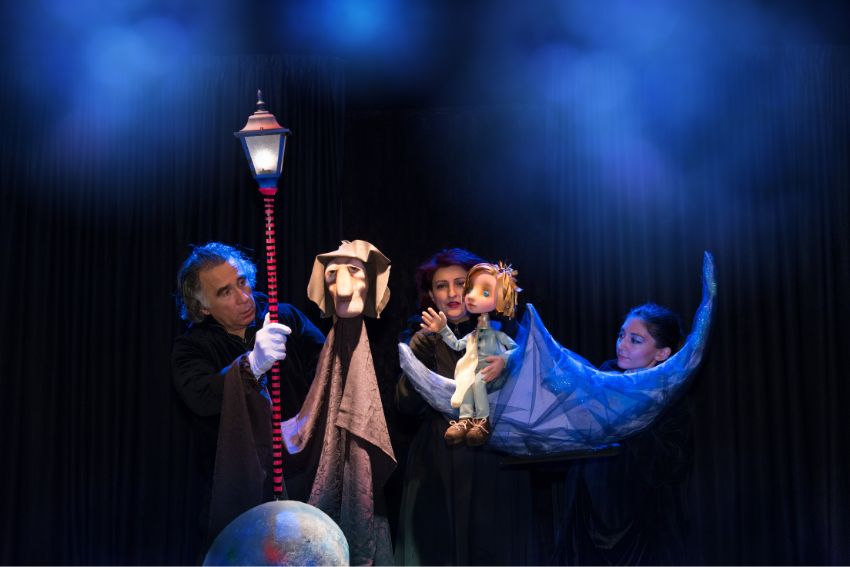
What Do You Need To Know About GCSE Drama Exams?
The GCSE Drama exam is a balanced assessment of creativity, technical knowledge, and critical thinking. By understanding the requirements of your exam board, preparing thoroughly for each component, and focusing on the details during practical and written assessments, you can excel in both the performance and theoretical aspects of the course. So, let’s explore more about drama exams down below.
Exam Boards and Their Specifications
AQA
The AQA GCSE Drama course is known for its balance between practical and theoretical components. Students focus on performing, devising, and analysing drama, with opportunities to evaluate live theatre.
Edexcel (Pearson)
Edexcel’s GCSE Drama emphasises real-world applications of theatre. It incorporates devising, performance, and critical analysis, encouraging students to connect their learning to live performances.
OCR
OCR’s GCSE Drama course provides a highly flexible structure, allowing students to explore a wide range of dramatic styles and approaches. It values creativity and critical thinking, with a strong focus on live theatre.
WJEC/Educas
The WJEC/Eduqas GCSE Drama course is distinctive for its emphasis on performance texts and the study of live theatre. It encourages students to apply theoretical knowledge to practical scenarios and evaluate the effectiveness of performances.
Exam Format For GCSE Drama
Each exam board divides the GCSE Drama assessment into three key components:
Devising Drama (Practical Work)
- Students create an original performance based on a stimulus provided by their teacher.
- Marks are awarded for creativity, collaboration, and the ability to reflect on the creative process through a written or verbal log.
Performance of Texts (Practical Work)
Students perform scenes from a play, showcasing their acting skills and interpretation of the text.
Marks focus on vocal delivery, movement, and characterisation.
Written Examination (Theoretical Study)
The written exam typically includes: Analysis of a set performance text. Evaluation of a live or recorded theatre production. Remember, exam lengths vary by board but are generally 1 hour 30 minutes to 1 hour 45 minutes.
How Marks Are Distributed For GCSE Drama Exams
The weighting of marks differs slightly by exam board, but it generally follows this pattern:
Devising Drama: Around 30–40% of the total marks.
Performance of Texts: Approximately 20–30% of the total marks.
Written Examination: Roughly 30–40% of the total marks.
On What you Should Pay Attention To:
- Performance Skills: Focus on vocal projection, physical movement, and emotional expression during practical assessments. Ensure your characterisation is clear and matches the context of the play.
- Devising Logs and Reflections: Write detailed and structured logs that explain your creative choices, the challenges you faced, and how you overcame them. Use specific examples from your work to demonstrate your thought process.
- Written Exam Techniques: Pay attention to the command words in questions, such as “analyse,” “evaluate,” or “describe.” When analysing performance texts, reference specific moments in the play to support your answers.
- Time Management: Allocate your time wisely in the written exam, ensuring you leave enough time for extended response questions. Practise completing past papers under timed conditions.
- Preparation for Practical Assessments: Rehearse thoroughly and ensure every group member understands their role. Pay attention to feedback from teachers and peers to refine your performance.
- Live Theatre Evaluations: Take detailed notes during live or recorded performances, focusing on key moments and how they relate to the exam criteria.
How To Revise For GCSE Drama?
Revising for GCSE Drama requires a blend of practical preparation and theoretical study. Unlike purely academic subjects, Drama involves honing performance skills, analyzing texts, and evaluating live theatre. To achieve success, students need a focused approach to both the practical and written components of the course. Here are some effective tips for GCSE drama revision, which will ease process for you:
Effective Revision Tips for GCSE Drama
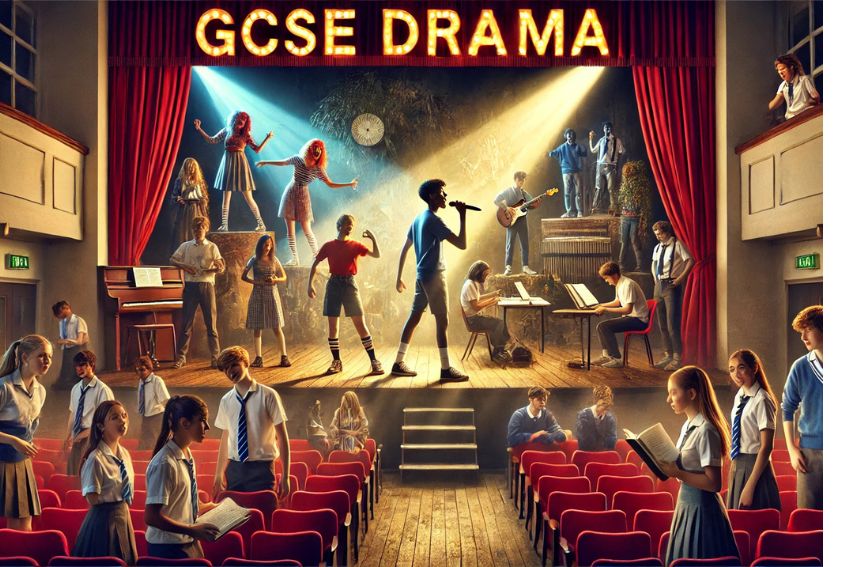
Create a Revision Schedule
Dedicate specific days to practical rehearsals, set text analysis, and live theatre evaluations. This ensures a balanced approach and prevents last-minute cramming. Including time to work on past papers helps you understand exam expectations and improve your written responses.
Use Flashcards for Key Terms
Write down important drama terminology such as “proxemics,” “genre,” or “performance conventions.” Regularly test yourself or use apps like Quizlet for a more interactive experience. Flashcards are especially useful for memorising key terms that are frequently tested in exams.
Watch Live Performances
If possible, attend live theatre or watch recorded productions online. Focus on the elements required for your evaluation, such as acting techniques, stage design, and audience interaction. Online platforms like Digital Theatre+ or YouTube can provide access to high-quality performances for analysis.
Practise with Your Group
For performance assessments, rehearse regularly with your group. Assign roles and responsibilities early, and provide constructive feedback to each other to refine your delivery and staging. Online tutors can guide group practice by offering expert tips on performance and staging.
Record Your Performances
Record your rehearsals to spot areas for improvement in acting, staging, or technical elements. Watching your own performances can highlight nuances you might miss during practice. Tutors can review recordings and provide personalised feedback to help you elevate your performance.
Seek Help from Tutors and Online Tutors
Online tutors can offer targeted guidance tailored to your exam board’s specifications. They can help you refine acting techniques, improve your written evaluations, and confidently tackle past papers. Whether it’s understanding set texts, preparing for live theatre evaluations, or perfecting your performance skills, tutors provide the support needed for success.
Write and Review Mock Answers
Practising exam answers under timed conditions is key to building confidence. Use past papers to familiarise yourself with question formats and command words. Reviewing answers against mark schemes or with the help of a tutor ensures you identify areas for improvement and learn how to structure high-scoring responses. Here are past papers for GCSE Drama from every exam board:
AQA GCSE Drama Past Papers
Edexcel GCSE Drama Past Papers
OCR GCSE Drama Past Papers
Eduqas GCSE Drama Past Papers
How to Use Past Papers Effectively
- Simulate Exam Conditions: Set a timer and complete the paper as if it’s the actual exam. This helps build exam-day confidence.
- Review and Learn: Compare your answers with the mark scheme to understand how marks are awarded. Take note of any recurring mistakes.
- Focus on Weak Areas: Use insights from past papers to target specific topics or skills where you’re struggling, such as evaluating technical elements or structuring extended responses.
- Work with Tutors: Share your completed papers with an online tutor or teacher to get personalised feedback on how to improve your answers.
Practical Components
While past papers are most useful for the written exam, you can also practise written reflections and evaluations for the devising and performance components. Reviewing these with a tutor or teacher will help you refine your reflective writing skills, which contribute significantly to your overall grade. If you want to know more about this topic, read more about GCSE Grade Boundaries.
By incorporating past paper practice into your GCSE Drama revision, you can gain a clearer understanding of exam expectations, improve your performance, and approach the written exam with confidence.
Resources for GCSE Drama: Books and Online Platforms
Here is a curated list of resources, including books and online platforms, to support you as a GCSE Drama student during your learning and revision:
| Book Title | Author(s) | Why It’s Great |
| AQA GCSE Drama | Annie Fox | Tailored for the AQA syllabus, offering clear explanations, practical examples, and exam tips. |
| Edexcel GCSE (9-1) Drama Student Book | Melissa Jones, Rob Thomson | Comprehensive coverage of the Edexcel specification, with practical advice for performances and exams. |
| WJEC/Eduqas GCSE Drama Student Book | Garry Nicholas, Marion Hall | Aligned with WJEC/Eduqas, focusing on performance texts, live theatre evaluations, and devising drama. |
| OCR GCSE Drama | Annie Fox, Kevin Brown | Written specifically for OCR students, including case studies, performance guidance, and exam strategies. |
| The Drama Teacher's Survival Guide | Margaret F. Johnson | Offers creative exercises and performance tips to enhance understanding of drama concepts. |
Additional Books for GCSE Drama in Table Format
| Book Title | Author(s) | Why It’s Great |
| AQA GCSE Drama | Annie Fox | Tailored for the AQA syllabus, offering clear explanations, practical examples, and exam tips. |
| Edexcel GCSE (9-1) Drama Student Book | Melissa Jones, Rob Thomson | Comprehensive coverage of the Edexcel specification, with practical advice for performances and exams. |
| WJEC/Eduqas GCSE Drama Student Book | Garry Nicholas, Marion Hall | Aligned with WJEC/Eduqas, focusing on performance texts, live theatre evaluations, and devising drama. |
| OCR GCSE Drama | Annie Fox, Kevin Brown | Written specifically for OCR students, including case studies, performance guidance, and exam strategies. |
| The Drama Teacher's Survival Guide | Margaret F. Johnson | Offers creative exercises and performance tips to enhance understanding of drama concepts. |
Online Platforms and Tools
- BBC Bitesize – GCSE Drama
Why It’s Great: Offers free resources for all exam boards, including topic summaries, quizzes, and tips for analysing live performances. - Digital Theatre+
Why It’s Great: Provides access to professional theatre productions, behind-the-scenes content, and analysis for live theatre evaluations. - Drama Online
Why It’s Great: Extensive library of play texts, study guides, and technical resources for exploring performance and theatre production. - YouTube Channels
- The National Theatre: Behind-the-scenes insights and professional performance clips.
- BBC Teach: Educational videos focusing on acting techniques and performance analysis.
- Taking the Drama: Tips for GCSE Drama written exams and practical assessments.
Apps and Digital Tools
- Quizlet – Create flashcards for key drama terms and concepts to help with memorisation.
- Gojimo Revision – Offers practice quizzes and topic summaries for GCSE Drama.
- Shakespeare Pro App – Ideal for studying Shakespearean texts, with annotated versions and performance insights. It’s Available on Android and iOS.
Future Path and Career Opportunities with GCSE Drama
GCSE Drama offers a wealth of opportunities for students, both in the performing arts and beyond. The skills gained in this subject—such as communication, teamwork, creativity, and problem-solving – are highly transferable, making it valuable no matter the career path a student chooses.
Future Academic Pathways
A-Level Drama and Theatre Studies – Students who enjoy GCSE Drama can progress to A-Level Drama to deepen their knowledge of theatre and performance. This course explores more complex texts, advanced performance techniques, and critical analysis.
Performing Arts Courses – Vocational courses, such as BTECs or diplomas in performing arts, are ideal for students who want a more practical, hands-on approach to theatre and acting.
Further and Higher Education Drama GCSE can lead to degrees in subjects such as: Theatre Studies, Acting, Performing Arts, Film and Media Production, Drama Therapy.
Other Related Fields – The skills developed in GCSE Drama are also useful for studies in media, communications, education, and even psychology, due to its focus on teamwork and understanding human behaviour.
Career Opportunities For GCSE Drama
| Career Path | Role Description |
| Actor/Actress | Perform in theatre, film, television, or commercials, bringing characters to life for audiences. |
| Director | Oversee the creative vision of a production, guiding actors and technical teams to create cohesive performances. |
| Playwright | Write scripts for plays, movies, or television, crafting compelling stories and dialogue. |
| Stage Manager | Coordinate all aspects of a production, ensuring smooth rehearsals and performances. |
| Lighting Designer | Design and implement lighting schemes to enhance mood, focus, and atmosphere on stage. |
| Sound Designer | Create and manage sound effects and audio elements for theatrical productions. |
| Costume Designer | Design and produce costumes that align with the characters and themes of a production. |
| Set Designer | Develop and build stage sets that visually represent the story and enhance the performance. |
| Drama Teacher | Educate students about acting, performance techniques, and theatre history in schools or private settings. |
| Drama Therapist | Use drama and role-play to help individuals explore emotions and address psychological challenges. |
| Producer | Manage the financial and logistical aspects of theatrical or film productions. |
| Television Presenter | Host TV shows, combining performance skills with on-screen communication. |
| Voice Actor | Provide voice-over work for animated films, video games, and advertisements. |
| Theatre Critic | Write reviews and analyses of live performances for newspapers, magazines, or online platforms. |
Of course, you can try other career paths too, like: arts administrator, marketing and PR specialist, event planners, film or media producer, content creator.
Transferable Skills for Other Careers
Even for students who don’t pursue drama-related careers, the skills developed in GCSE Drama are widely applicable:
- Confidence: Public speaking and performing help students become more self-assured.
- Teamwork: Working collaboratively on performances builds strong interpersonal skills.
- Problem-Solving: Devising and staging performances teaches creative and practical thinking.
Empathy and Emotional Intelligence: Understanding characters and motivations improves the ability to relate to others.
Conclusion
GCSE Drama is a vibrant and rewarding subject that goes beyond acting to develop critical life skills such as teamwork, creativity, communication, and confidence. It opens doors to exciting academic pathways and career opportunities in the performing arts, education, media, and beyond. Whether students aim to pursue a career in theatre or use the transferable skills in other industries, GCSE Drama provides a strong foundation for future success.
Preparing for GCSE Drama can be challenging, balancing practical performances with theoretical analysis. This is where online GCSE tutors can make a real difference. With personalised guidance, online tutors can help students refine their acting techniques, improve written evaluations, and confidently prepare for exams. They can also offer tailored feedback on devised and scripted performances, ensuring students maximise their potential.
By combining consistent effort, structured revision, and expert support from online tutors, students can excel in GCSE Drama and enjoy a fulfilling learning experience that will benefit them for years to come.
FAQs:
Is GCSE Drama hard?
GCSE Drama can be challenging but manageable with consistent practice. It combines performance and written analysis, so a balance of creativity and focus is key. Here you can find out What Are The Hardest GCSE Subjects.
Do you need GCSE Drama to be an actor/actress?
No, it’s not required to become an actor. However, it provides valuable skills and experience that can help you in the performing arts.
Is prior learning required for GCSE Drama?
No, prior learning isn’t necessary. The course starts with the basics, making it suitable for beginners.
Do I need to take exams to get into a GCSE Drama course?
No entrance exams are required. Most schools allow students to choose GCSE Drama as an option without additional requirements.
